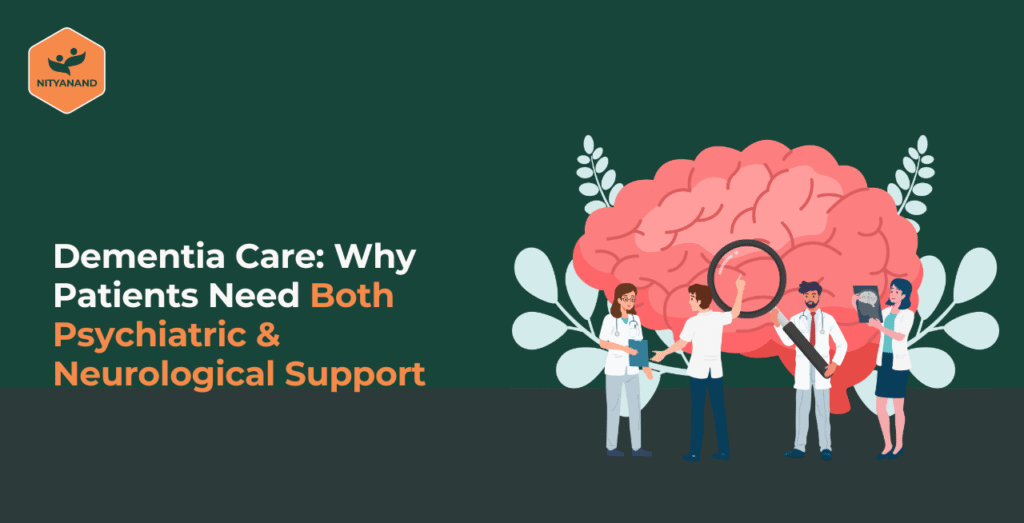Why Dementia Patients Need Integrated Psychiatric and Neurological Support


Dementia affects an estimated 57 million people worldwide, with over 60% living in low- and middle-income countries. Each year, nearly 10 million new cases are diagnosed, underscoring the growing global challenge this condition presents. Dementia is complex, impacting not only memory and cognition but also emotional and behavioural health. For patients and their families, managing dementia requires a comprehensive approach.
This blog explores why integrated psychiatric and neurological support is essential for the best possible care and improved quality of life.
What is Dementia and Why Does it Require Integrated Care?
Dementia is a progressive neurological disorder characterised by declining cognitive abilities, memory loss, and behavioural changes. Common types include Alzheimer’s disease, vascular dementia, and Lewy body dementia. Early detection is fundamental for effective management and better outcomes.
Traditionally, dementia care has been divided between neurology, which focuses on brain function, and psychiatry, which manages emotional and behavioural symptoms. However, treating dementia through either lens alone often falls short because the disorder affects both the brain’s physical health and the patient’s mental state. Integrated care combines these specialities, offering a comprehensive, patient-centred approach that addresses the full spectrum of dementia symptoms.
The Role of Psychiatry in Dementia Care
Psychiatric symptoms are common in dementia patients and can include depression, aggression, anxiety, and psychosis. These symptoms can severely impact a patient’s quality of life and complicate their care. Psychiatric care plays a crucial role in managing these behavioural and emotional symptoms through medication, counselling, and psychosocial interventions.
Psychiatrists also support families and caregivers, providing guidance on coping strategies and behavioural management. This psychosocial support is vital to creating a safer, more comfortable environment for dementia patients.
The Role of Neurology in Dementia Care
Neurology focuses on the brain’s cognitive functions, addressing symptoms like memory loss, confusion, and decline in executive functions. Neurologists use medications and cognitive therapies aimed at slowing the progression of symptoms and improving brain health. Early neurological assessment is critical for accurate diagnosis and timely intervention, allowing treatments to be started when they are most effective. Neurological care also involves monitoring disease progression and adjusting treatment plans accordingly.
Benefits of Integrated Psychiatric and Neurological Support
By integrating psychiatric and neurological care, patients receive a holistic approach that simultaneously targets both cognitive decline and emotional well-being. Coordinated care teams can better manage complex symptoms and tailor treatments to the patient’s unique needs. This collaboration improves symptom control, reduces hospitalisations, and enhances overall patient outcomes. Families also benefit from consistent communication and a unified care plan, reducing confusion and stress.
How Integrated Care Improves Family Involvement and Support
Integrated care fosters a collaborative relationship with families, providing them with education about dementia and training in caregiving techniques. Psychiatric and neurological teams work together to create a clear, unified treatment plan that families can follow at home. This approach empowers caregivers, improving their confidence and reducing burnout. Support services such as counselling and respite care further assist families in managing the emotional and practical challenges of dementia care.
Bottom Line
Integrated psychiatric and neurological care is essential for effective dementia management. By combining these two fields, patients receive comprehensive treatment that addresses both cognitive and emotional symptoms, improving overall well-being. Families benefit from coordinated support and clearer care plans, making the journey with dementia more manageable.
Integrated Care Approach for Dementia at Nityanand Rehab Centre
At Nitynand Rehab Centre, we offer specialised psychiatric and neurological services for dementia patients. Our multidisciplinary team develops personalised care plans that integrate medical, psychological, and social support to address every aspect of dementia. We also provide family-oriented services, including caregiver education, counselling, and support groups to help families cope effectively. If you have a loved one suffering from dementia, book an appointment now!

